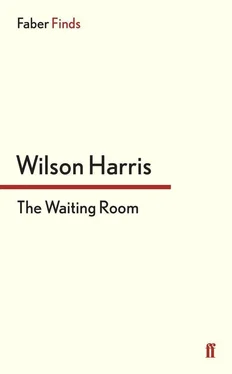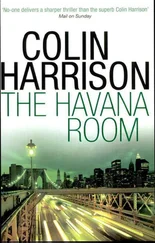Wilson Harris - The Waiting Room
Здесь есть возможность читать онлайн «Wilson Harris - The Waiting Room» весь текст электронной книги совершенно бесплатно (целиком полную версию без сокращений). В некоторых случаях можно слушать аудио, скачать через торрент в формате fb2 и присутствует краткое содержание. Год выпуска: 2012, Издательство: Faber Finds, Жанр: Современная проза, на английском языке. Описание произведения, (предисловие) а так же отзывы посетителей доступны на портале библиотеки ЛибКат.
- Название:The Waiting Room
- Автор:
- Издательство:Faber Finds
- Жанр:
- Год:2012
- ISBN:нет данных
- Рейтинг книги:4 / 5. Голосов: 1
-
Избранное:Добавить в избранное
- Отзывы:
-
Ваша оценка:
- 80
- 1
- 2
- 3
- 4
- 5
The Waiting Room: краткое содержание, описание и аннотация
Предлагаем к чтению аннотацию, описание, краткое содержание или предисловие (зависит от того, что написал сам автор книги «The Waiting Room»). Если вы не нашли необходимую информацию о книге — напишите в комментариях, мы постараемся отыскать её.
The Waiting Room — читать онлайн бесплатно полную книгу (весь текст) целиком
Ниже представлен текст книги, разбитый по страницам. Система сохранения места последней прочитанной страницы, позволяет с удобством читать онлайн бесплатно книгу «The Waiting Room», без необходимости каждый раз заново искать на чём Вы остановились. Поставьте закладку, и сможете в любой момент перейти на страницу, на которой закончили чтение.
Интервал:
Закладка:
Wilson Harris
The Waiting Room
For Margaret,
Mario and Valerie Carboni
and
Denis Williams
It is a wretched thing to confess; but it is a very truth that not one word I ever utter can be taken for granted as an opinion growing out of my identical nature — how can it, when I have no nature?
JOHN KEATS (from a letter to Richard Woodhouse, October 1818)The rhetorician would deceive his neighbours,
The sentimentalist himself, while art
Is but a vision of reality.
W. B. YEATS… a moment of exhaustion, of appeasement, of absolution, and of something very near annihilation….
T. S. ELIOT… in a dream with strange new speech:
Yourself you are as unaware as I
And fertile is the silence we endure.
MARTIN CARTERAuthor’s Note
THE WAITING ROOM is based on the disjointed diary of the Forrestals which came into my hands many years ago. Susan Forrestal described this diary in one section as “her husband’s log book” but it would appear that she and possibly others were engaged in an art of fiction peculiar to themselves.
By fiction I do not mean to deny certain literal foundations but rather to affirm these absolutely as a mutual bank or living construction of events; those who collaborated accepted the enigma of such self-proportion and sought therefore to discover themselves concretely, as well as brokenly, in the mystery of a common vanishing life, day to day, year to year.
Susan suffered from an incurable complaint of the eyes and after three operations became almost totally blind at the age of forty. She was the mistress of a man who left her suddenly, it would appear, after a violent quarrel, and disappeared without trace. He remained nameless in the log book, though he may have, at one time, contributed certain entries which give details of his remarkable collection; ornaments and pieces of interest. Susan actually married someone else some time after this, who — from all that can be gleaned — was extremely solicitous for her well-being, but her original lover (with whom she obviously had had much in common) continued to haunt her (to put it in her own words) and to arouse within her a “living” crew or presence. And in fact “he” became — according to a peculiar entry in the diary—“hieroglyph and vessel of experience, the supreme positive fiction for me of nothingness.” By which she seemed to imply that a fiction which appears to grasp nothingness runs close to a freedom of reality which is somethingness.
Susan and her husband (mention of whom does not clearly occur until BOOK 2) died in an explosion which wrecked their home and much of their belongings, antiques, ornaments, etc. The log book survived, though certain sections were half-obliterated…. But this — while apparently depleting continuity — only served to enhance the essential composition of the manuscript that involved accidental deletions or deliberate erasures, reappraisals, marginal notes, dissociations of likely material (as well as associations of unlikely material) to confirm, and blend into, a natural medium of invocation in its own right.
And this disproportionate, sometimes shocking, condition, was the world in particular of Susan Forrestal, whose “operations” led her to accept her own “weakness” as a normal state which needed to confess its own broken existence to plumb and visualize its true relationship to a capacity for freedom.
I am only too well aware of my own shortcomings in attempting to uncover the curious unity I myself felt as existing between essential spirit or form and actual content of the log book.
W.H.
Postscript: In the text following I have used inverted commas around “he” to emphasize that the lover in Susan’s memory was indeed sheer phenomenon of sensibility rather than identical character in the conventional sense. Where I have neglected, however, to use such commas I trust the distinction is one which speaks for itself.
Book 1. The Void
ONE. Image of Conviction
Susan Forrestal was blind. She drew the palm of her hand slowly across her face as if to darken her own image, and to discover therein another sunof personality. “ He ” it was whomshe began to discern like the ancient seal — the ancient soulof love.
The sun fell on the slumbering brickwork of her flesh. Through the blind or curtained window where “he” sat and watched FROM WITHIN HER SKULL, the tops of vehicles could be seen as they passed, and still beyond — upon the pavement at the opposite side of the street — passersby were reflected in a shop window.
The life of one’s time affected one, “he” thought, like a restless image or span which seemed to pass within and beyond oneself and overlap each flickering stalemate of apprehension.
The sun burned and faded like a rag on fire, intensity, luminous paint, stone, canvas: a shred of emotion which gleamed for an instant and grew into an address one felt one had made or actually deciphered in the heart of chaos. It was a borrowed shelter of vision, flaked, holed, animated façade, instinctive shock of recognition, number, letter of gravity. It was the minted incongruous mask one wore, whose features as they stared through glass into the street were equally stamped with a bodily and ghostly design shared by immediate figures of acquaintance and remote figures of antiquity. This was “his” main legend and business, the business of preserving someone (like and unlike himself), of disguising someone whose proximity to himself was as nebulous as dust and adamant as stone.
“His” relationship then to himself (and to her) was baffling. And if it appeared at times to spark into being a certain solid community, there were other times when it all seemed to hang together by the veriest shred of fellowship, emotional relief as well as entanglement. It was a question of the marriage of roots as well as branches and arms of dispersal.
The day was now darkening as “he” appeared to reside within and yet adventure throughout her skull of the world. The mushroom of an umbrella swam within the shop window above the pavement. And thus — almost against “his” will — began “his” transportation into her subject and object, alteration in the proliferate colour of living and dead relationships, animation and inanimation, the shadow within the moved stone and without the immovable flesh. “He” had been seized by her fear of “him”. As if “he” stood naked and receptive within the room above the thoroughfare. And the growing shelter and embrace he began to suffer turned, as the clock died and still ticked, into a total presence he regained and knew. Like a garment — necessary and binding and absurd—“he” had forgotten he still carried or wore, whose pliant arms held him in the void of time until they became charged with constriction and feeling. To be naked and still clothed (as he felt himself to be) was to cling to a stem … extremity….
She sat now beside him in the waiting room ( Susan drew the palm of her hand slowly across her face as if it had turned to stone )naked as he in the poverty of existence. *She drew him closer still within the skin of another incongruous skeleton they shared, flesh or wood, swimming in the glass of their shop window within and without. Antique display. Waiting room.*
It was the ornamental structure of her calves and a curious gravity of frame which appeared to strip her and give him bone and currency, blunt shadow, pregnant reality…. He felt he was being drawn into a revelation of unique and terrifying possession on entering the room and taking his place beside her. Was it the most curious rigidity of the past or most intimate fantasy of the present she fought and entertained?
Читать дальшеИнтервал:
Закладка:
Похожие книги на «The Waiting Room»
Представляем Вашему вниманию похожие книги на «The Waiting Room» списком для выбора. Мы отобрали схожую по названию и смыслу литературу в надежде предоставить читателям больше вариантов отыскать новые, интересные, ещё непрочитанные произведения.
Обсуждение, отзывы о книге «The Waiting Room» и просто собственные мнения читателей. Оставьте ваши комментарии, напишите, что Вы думаете о произведении, его смысле или главных героях. Укажите что конкретно понравилось, а что нет, и почему Вы так считаете.












